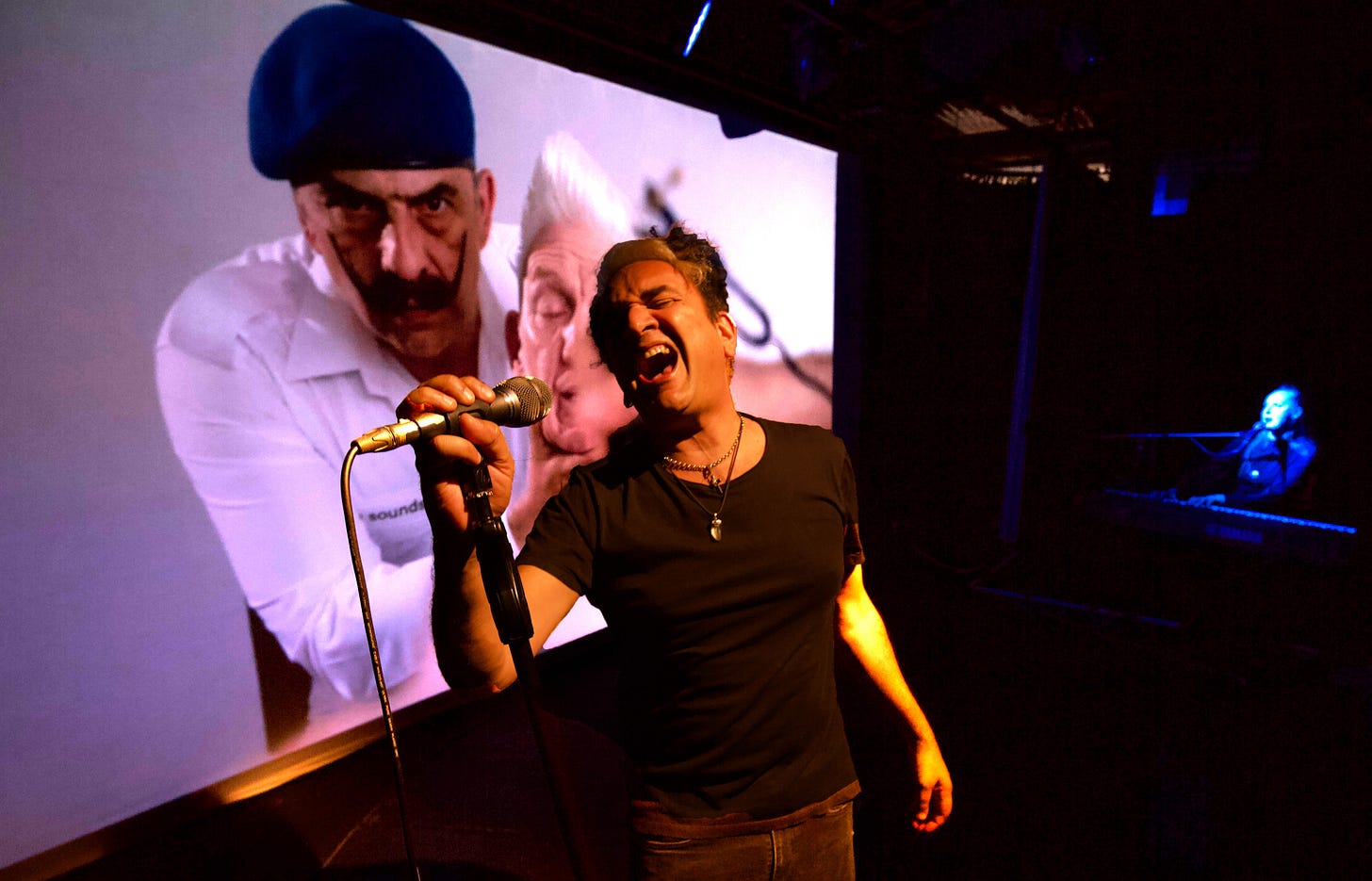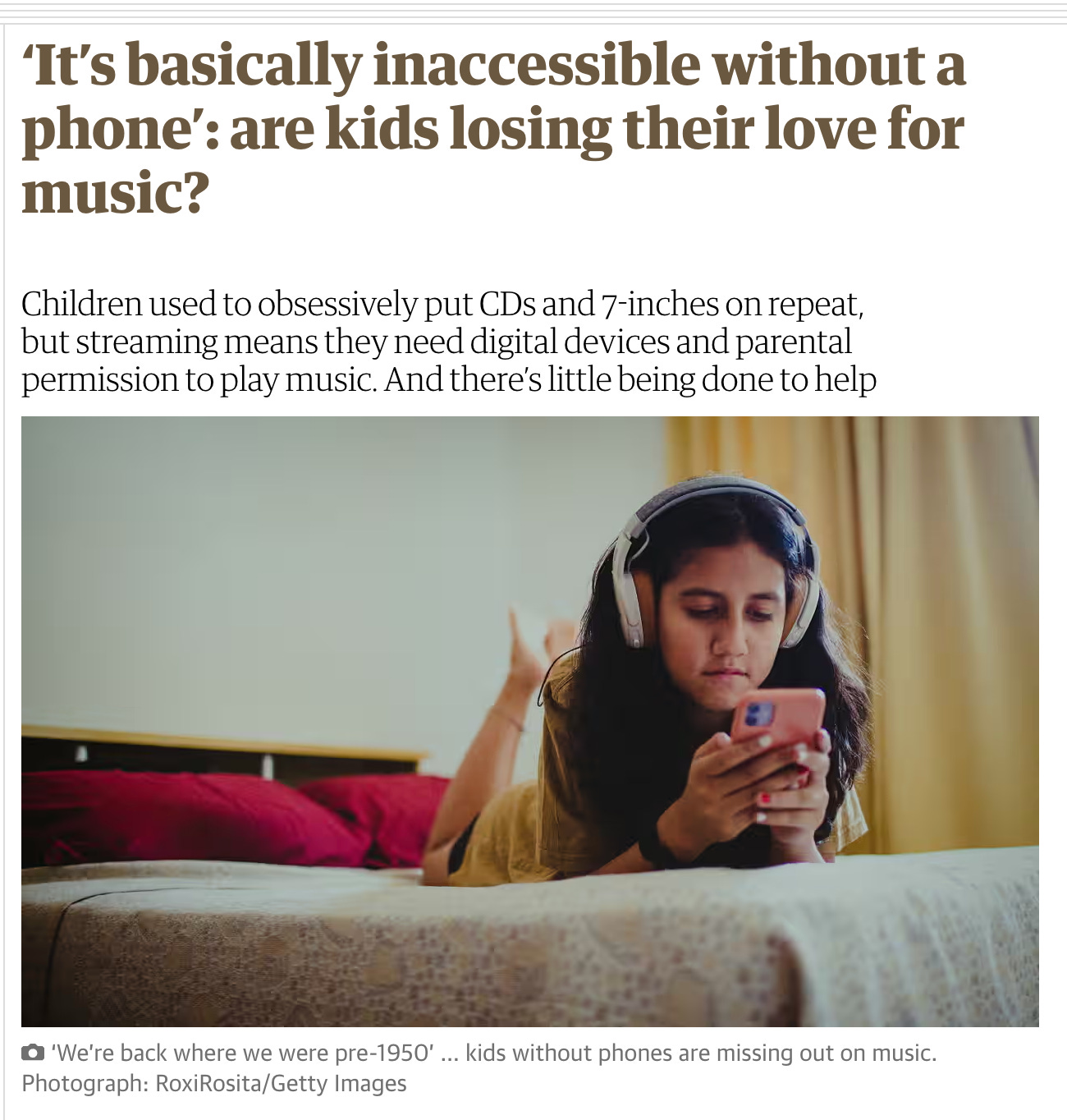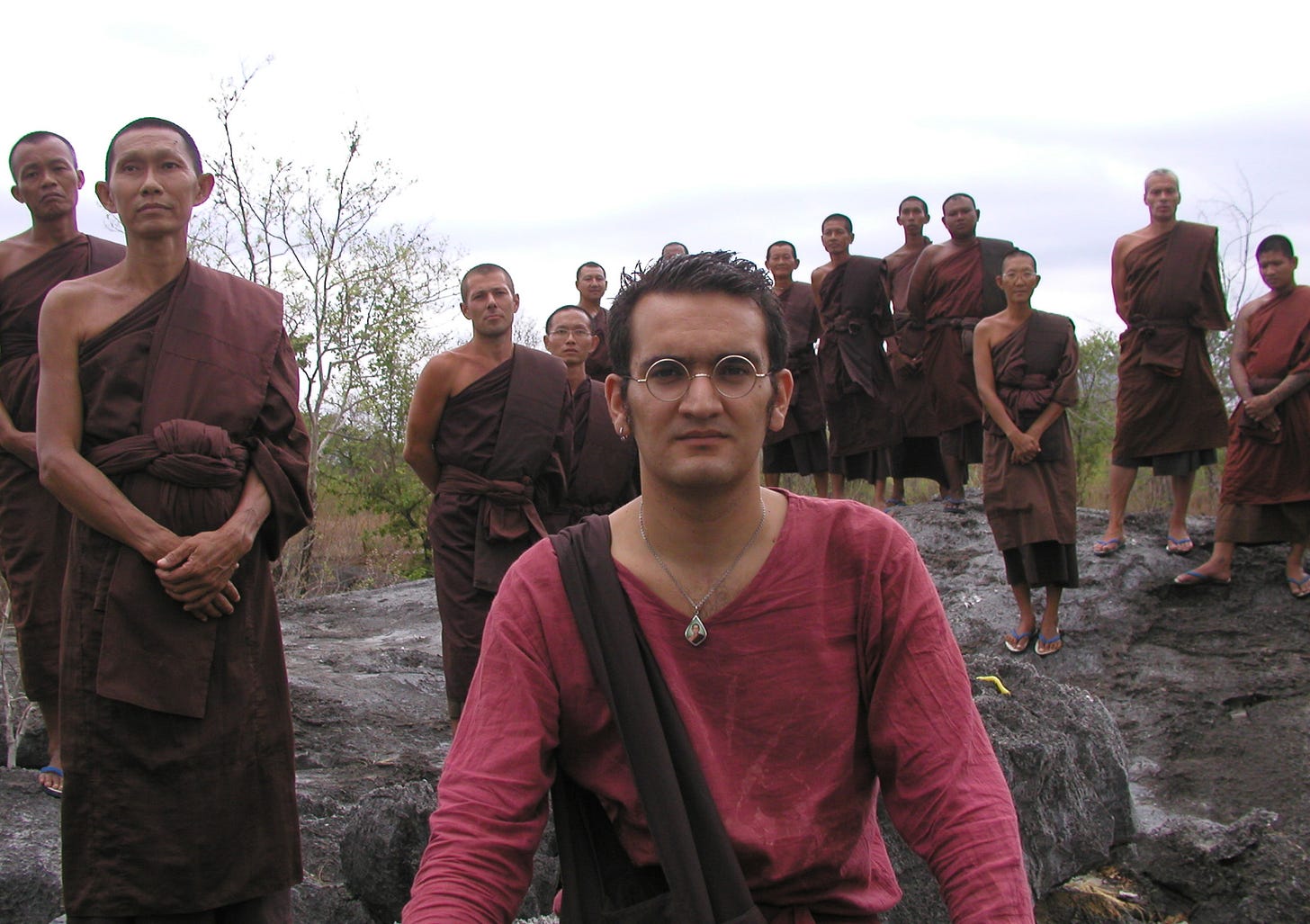Dear reader, subscriber, friends. It’s been a while, so I thought I’d jump in with a friendly update—I'm halfway through my first tour of Super Connected, and I couldn't be more excited to share this journey with you as we continue our ongoing battle with big tech and the digital norms we are all facing today.
“Super Connected is a collective of theatre, film and music, forming a fusion tantamount to a rock opera. Kate Alderton directs the live production, with Tim Arnold directing the film. Both are accomplished with aplomb. Arnold’s alter-ego brings to mind Bowie incarnations Ziggy Stardust and Aladdin Sane, with FKA Twigs’ eyes thrown in for good measure. But perhaps the moments that will live longest in the memory are those in which Tim Arnold turned away from the audience to rage against the messages on the screen behind him.”
- Roger Kay, UK Fringe Review (full review)
When I read that review after our Brighton show, it became clear that when I go out to perform Super Connected, it isn’t what I thought it would be. It’s not touring an album, it isn’t screening a feature film and it isn’t flexing my thespian DNA.
It’s getting in the ring with Big Tech. For a one-weapon-each showdown.
My microphone Vs. their screen.
So the live show has taken me back to the spark of inspiration that made me write the album in the first place: the demotion of sound and promotion of visuals in the digital age.
Lost In An Image? Start With The Sound
Technology has been my god since I sampled the sound of water on a Casio SK5 when I was 12 and programmed algorithms on a Yamaha DX7 at 14. Building a multi track recorder out of broken cassette players in my teens was my happy place. Getting an Apple PowerBook in ‘98 when I was 23 (from a guy who used it to run the strings track for The Verve’s Bitter Sweet Symphony) changed my creative process forever.
So why am I putting myself on stage between the general public and tech companies up and down the UK this month?
Well, it’s less binary than that. I’m actually putting myself on stage between the general public and a film of two stories: a story of a tech company’s global growth, and another story about a family whose bond with each other is dying.
How the 2 stories are linked is what Super Connected is all about, and in performing it live, I’ve nominated myself to be that link. And it’s as rough as it is holy to experience.
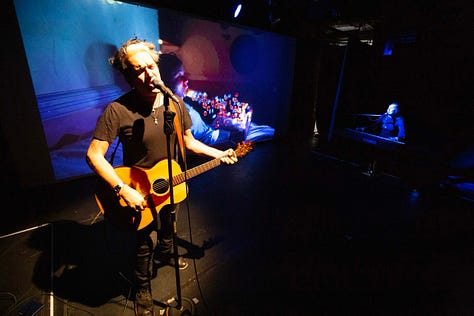
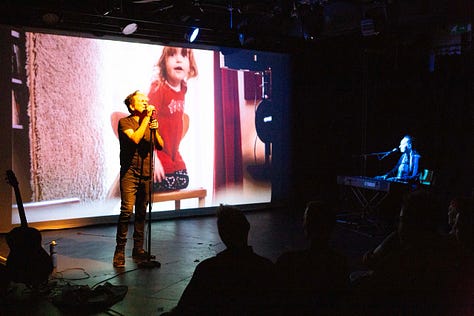

The Cathartic Power of Theatre
But why am I doing this? That’s what I began to ask myself this week after reading that review. Why now? With Facebook currently contacting its users this week to get permission (or objections) to train their AI on personal data, and Apple releasing a new ad that literally destroys all art so that it can be repurposed as a new iPad, it does seem like the digital landgrab is closing in?
When I did the BBC 5 Live interview with Nihal a few weeks ago, he mentioned that Super Connected had taken up a huge part of my life. I only saw the video feed for it this week, and seeing his face, I could tell he said it with care and concern for my wellbeing. His intuition was right. This has been a tough journey. So why do it?
Because it’s hard for any of us to see how tech companies directly impact our lives. Making the link between a real person’s mental health struggles and the profits of large tech companies isn’t straightforward and gets lost in debate and side-ism, ironically, in the digital space.
This is what art and theatre is for. To let us pause, stand back and help us see things differently, so we can understand what normal day to day life can not, or will not reveal to us. As the great actress Janet Suzman once told me…
“Theatre is a way to reveal truth through disguise”
The Decontextualisation of Sound
I came at this topic as a musician and champion of the ‘album’. The art-form of listening to, and making long-form music was trashed by the streaming industry because someone realised that the monetary value of a single song on Spotify was only contained in the first 30 seconds of that song. Which meant that if you could make shorter songs, you could play more songs…and thus make more royalties.
This is a huge topic of discussion with music students I have met during my lectures at The Waterbear College of Music in Brighton. Young people are finding an inspiring, embodied outlet of expression with music and music technology, only to be turned into a data point for extraction by social media’s broken promise that creating ‘content’ 24/7 will somehow benefit their future.
Major labels have been slashing intros on new songs for years now. This is affecting the very heart of music creation for young people. And whilst I may find it easy to use an iPod classic to listen to music without any internet, digital ID or passwords, that freedom and experience of music is not a norm for young people today.
“A good LP is a being, it’s not a product. It has a life-force, a personality, and a history, just like you and me. It can be your friend. Try explaining that to a weasel.” - Iggy Pop
And then you get ads interrupting albums and artists getting unfairly remunerated; this is a crisis for music and everything we know that music can do for us remodified for ‘customer convenience’. Which makes the customer sound like the enemy.
Which is not true. The customer is a lover of music who is one of our tribe, not theirs.
But with the the streamers controlling our relationship, artists and fans have been given new roles, and it’s destroyed an age-old sacred relationship. Artists are now content creators and fans are subscribers. It’s not a sacred bond. It’s a short term rental of convenience created by an absentee landlord who is laughing all the way to the bank. And to add insult to injury, social networks have evolved over the last two decades with only the smallest creative investment into sound.
Can you imagine if they had developed ‘mute’ buttons for the video instead of a mute button for the sound? Our ears would have got the kind of training that virtuosos receive at the Deep Listening Institute. Sound helps us draw our own pictures onto the theatre in our mind, whereas an image is the director’s domain.
If the director is doing it for art, then we’re in good hands, but if everything we watch is to benefit 3rd party advertisers who we don’t even know, then we’re just slaves rowing in the galley of the Good Ship big tech under the feet of our masters who are up on deck, getting all the fresh air while we sweat out our digital anxiety below.
You can watch without listening. But you can’t listen without watching.
And that’s the first reason I got into the ring with big tech on this tour.

The Unregulated Digital Playground
The second reason is that tech companies have created apps for the whole of humankind without making any ‘usage’ distinction between minors and adults.
We have age restrictions for alcohol, cigarettes, cars and guns, but if it’s on a screen, whether you’re 4 or 40, anything goes on a smartphone!
This, as you read it, may feel like insanity, but when you stop reading (as you must at some point), that insanity will diminish. Because it’s become the ‘norm’, and the most powerful companies on earth are not in a hurry to change that norm.
It stopped diminishing for me in 2016 with the true story of a teenager suffering with screen addiction. The true story that Super Connected is based on.
For the last 8 years, I have never been able to un-see what I have seen with big tech’s effects on young people, friends, family and colleagues. I live with it every day.
I have a photographic memory. So for better or for worse, it’s ever present for me.
My Lucky Buddhist Escape
The insanity of the world we entered around the time of the 1st iPhone in 2007 has never, ever become the norm to me. Am I immune to the addictive nature of smartphones and screen-time? Definitely not. But I was lucky. The week I got my first smartphone, I was renewing my Buddhist vows in Thailand. If we imagine stocks and shares as containers of spiritual units, I bought at the right time.
There was a vibration and ringing bell on my iPhone, right in the middle of a Buddhist ritual, in a temple. Apparently, this was called ‘a notification’. I have issues with auditory overload related to my autism. I reacted dramatically to the interruption.
I scrolled through the brand new iPhone and found the button that gave an option to ‘Turn Off’ all notifications. I turned it off and never heard notifications ever again.
17 years later and now on my 10th iPhone, I have still never heard a single notification. I only began to realise that having notifications switched on was the ‘norm’ during a meeting with the mayor of London at City Hall in 2015 when everyone in the room had phones buzzing between, and during each other’s speeches.
I escaped that norm as a result of my auditory overload, and a Buddhist community.
They saved me from what author Jonathan Haidt calls ‘the four foundational harms’.
Social deprivation, sleep deprivation, attention fragmentation, and addiction.
Cultivating Concentration. Ditching Distraction
To escape these harms, it takes the kind of practices you learn from Buddhism. But trying to begin a holistic practice like that when you’re already suffering from those harms is almost impossible. This is the looping conveyer belt that we’ve been ‘nudged’ onto. We’re on a vicious cycle of spiritual inertia that only benefits big tech.
I have seen it in myself, people I love, people I work with, people who used to hold a conversation with their eyes, all just deferring to the norm.
I am not unscathed. I’m just aware. All the time. It’s draining. I’m in a permanent state of battling my own digital addiction.
And maybe that’s why I’m the only lunatic to make an album and film about it. And then go on the road to share it with people who are also stuck in the digital spell but who also want to be aware. For their children, for themselves and for their community.
Discovering Fellowship: Embracing Smartphone-Free Moments
These last few weeks have been so inspiring, especially with parents and their kids who are active in the Smartphone Free Childhood campaign. I’ve felt like the lunatic on the hill for years. So this tour has been healing for me in that way, to find the others.
It’s true, in 2021 I campaigned against Spotify, in 2023 I wrote a celebrity backed letter to Apple, to protest the omission of Super Connected on the Apple Music platform.
I’ve been called a disruptor. But I am only disrupting norms in search of a more mentally and spiritually sustainable future for us all in this digital landscape.
I am angry about the way things are with big tech. But anger is an energy. And when we put it in between the audience and big tech at the Super Connected shows, it’s the audience who are collecting data, and it’s the audience who are crying and laughing at all of our own digital norms. Because that’s what I’m singing about, and that’s what we’re watching together, without any digital interruptions.
And the conditions about the film remains intact. To watch it, you can’t be alone. In fact, the film projector cannot play Super Connected until there’s a group of people. That’s the technology I want to promote. The ultimate technology: the power of us being together in a shared space without advertisers in our pockets.
Even though we’ll only be doing 3 more shows, the creative team and I are already feeling a tangible hope in our hearts when we meet the audience in the Screenless Socials after the performance. It is absolutely amazing what kind of human magic can emerge with art when a community share space for 75 minutes, without smartphones.
It has been the gift of a lifetime for me, to meet and play with… all the other lunatics on the hill. I’m so glad I found you. Thank you. See you at the next show. Tim Xx
29th May Bath Fringe Festival - Chapel Arts Centre
30th May Reading - South Street Arts Centre
04th June - London - The Cockpit Theatre
Official Super Connected Website - Album | Film | Theatre Show




